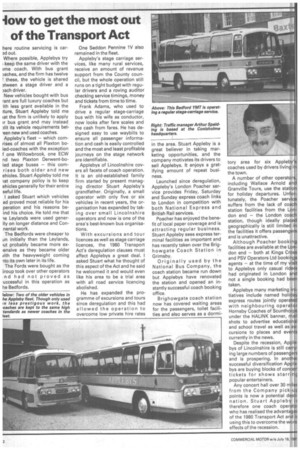low to get the most out of the Transport Act
Page 38

If you've noticed an error in this article please click here to report it so we can fix it.
here routine servicing is car3c1 out.
Where possible, Applebys try keep the same driver with the ime coach. With bus grant mches, and the firm has twelve these, the vehicle is shared .tween a stage driver and a mch driver.
New vehicles bought with bus rant are full luxury coaches but ith less grant available in the iture, Stuart Appleby told me at the firm is unlikely to apply abus grant and may instead plit its vehicle requirements bet.een new and used coaches.
Appleby's fleet — which comrises of almost all Plaxton boied-coaches with the exception I one Willowbrook, one ECW nd two Plaxton Derwent-boied stage buses — this cornrises both older and new ehicles. Stuart Appleby told me at company policy is to keep ehicles generally for their entire seful life.
I asked Stuart which vehicles ad proved most reliable for his peration and his reasons beid his choice. He told me that ie Leylands were used generIly on longer distance and Connental work.
The Bedfords were cheaper to initially than the Leylands, lut probably became more exlensive as they became older with the heavyweight coming -Ito its own later in its life.
The Fords were bought as the 3roup took over other operators nd had not proved as uccessful in this operation as he Bedfords. One Seddon Pennine 1V also remained in the fleet.
Appleby's stage carriage services, like many rural services, receive an amount of revenue support from the County council, but the whole operation still runs on a tight budget with regular drivers and a roving auditor checking service timings, money and tickets from time to time.
Frank Adams, who used to drive a regular stage-carriage bus with his wife as conductor, now looks after fare scales and the cash from fares. He has designed easy to use waybills to ensure all passenger information and cash is easily controlled and the most and least profitable journeys on the stage network are identifiable.
Applebys of Lincolnshire covers all facets of coach operation. It is an old-established family firm started by present managing director Stuart Appleby's grandfather. Originally, a small operator with only five or six vehicles in recent years, the organisation has expanded by taking over small Lincolnshire operators and now is one of the area's best-known bus organisations.
With excursions and tour licences as well as stage carriage licences, the 1980 Transport Act's deregulation clauses must affect Applebys a great deal. I asked Stuart what he thought of this aspect of the Act and he said he welcomed it and would even like his area to be a trial area with all road service licencing abolished.
He has expanded the programme of excursions and tours since deregulation and this had allowed the operation to overcome low private hire rates in the area. Stuart Appleby is a great believer in taking marketing opportunities, and the company motivates its drivers to sell Applebys. It enjoys a gratifying amount of repeat business.
Launched since deregulation, Appleby's London Poacher service provides Friday, Saturday and Sunday express coach links to London in competition with both National Express and British Rail services. • Poacher has enjoyed the benefit of local paper coverage and is attracting regular business. Stuart Appleby sees express terminal facilities as important and has recently taken over the Brighowgate Coach Station in Grimsby.
Originally used by the National Bus Company, the coach station became run down but Applebys have renovated the station and opened an instantly successful coach booking office.
Brighowgate coach station now has covered waiting areas for the passengers, toilet facilities and also serves as a dormi
tory area for six Apple coaches used by drivers livin the town.
A number of other operat including Wallace Arnold d Granville Tours, use the stati for holiday departures. Unf: tunately, the Poacher serv suffers from the lack of co station facilities from the L don end — the London co station, though ideally pla geographically is still limited the facilities it offers passeng and is unattractive.
Although Poacher booki facilities are available at the Ld don end — both at Kings Crp and PSV Operators Ltd bookir! agents — at the time of my v to Applebys only casual rid had originated in London a not a single booking had b taken.
Applebys many marketing tiatives include named holid express routes jointly operat with neighbouring operat r Hornsby Coaches of Scunthor under the HALINK banner, m shots to advertise educatiop and school travel as well as cursions to places and eve' currently in the news.
Despite the recession, Appl bys of Lincolnshire is still carr ing large numbers of passenge and is prospering. In anoth successful diversification Appl bys are buying blocks of concerl tickets for shows starrinc popular entertainers.
Any concert hall over 30 milv. from the Company pick-or points is now a potential des6 nation. Stuart Appleby k therefore one coach operatbi who has realised the advantag0 of the 1980 Transport Act and using this to overcome the woris effects of the recession.




















































